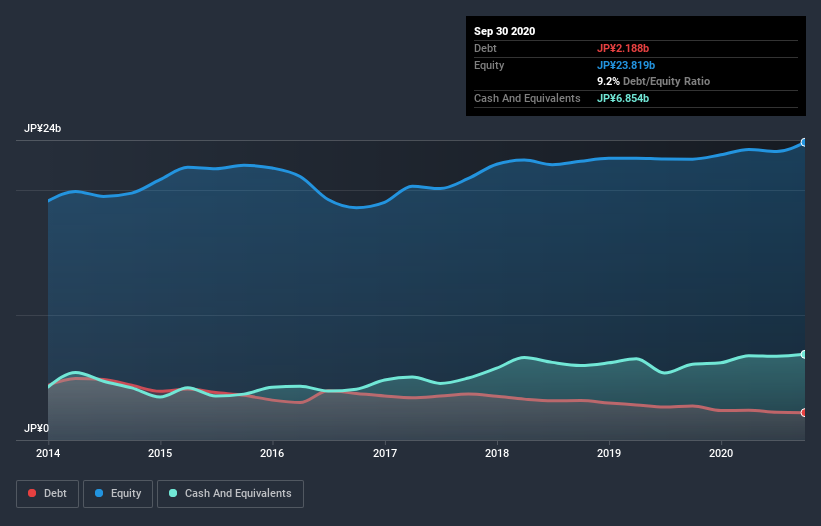We Think Soken Chemical & Engineering (TYO:4972) Can Manage Its Debt With Ease

The external fund manager backed by Berkshire Hathaway's Charlie Munger, Li Lu, makes no bones about it when he says 'The biggest investment risk is not the volatility of prices, but whether you will suffer a permanent loss of capital.' So it seems the smart money knows that debt - which is usually involved in bankruptcies - is a very important factor, when you assess how risky a company is. As with many other companies Soken Chemical & Engineering Co., Ltd. (TYO:4972) makes use of debt. But the more important question is: how much risk is that debt creating?
What Risk Does Debt Bring?
Debt is a tool to help businesses grow, but if a business is incapable of paying off its lenders, then it exists at their mercy. Ultimately, if the company can't fulfill its legal obligations to repay debt, shareholders could walk away with nothing. However, a more frequent (but still costly) occurrence is where a company must issue shares at bargain-basement prices, permanently diluting shareholders, just to shore up its balance sheet. Of course, plenty of companies use debt to fund growth, without any negative consequences. When we examine debt levels, we first consider both cash and debt levels, together.
See our latest analysis for Soken Chemical & Engineering
How Much Debt Does Soken Chemical & Engineering Carry?
The image below, which you can click on for greater detail, shows that Soken Chemical & Engineering had debt of JP¥2.19b at the end of September 2020, a reduction from JP¥2.72b over a year. However, its balance sheet shows it holds JP¥6.85b in cash, so it actually has JP¥4.67b net cash.

How Healthy Is Soken Chemical & Engineering's Balance Sheet?
The latest balance sheet data shows that Soken Chemical & Engineering had liabilities of JP¥10.1b due within a year, and liabilities of JP¥1.92b falling due after that. Offsetting these obligations, it had cash of JP¥6.85b as well as receivables valued at JP¥8.55b due within 12 months. So it can boast JP¥3.43b more liquid assets than total liabilities.
This excess liquidity suggests that Soken Chemical & Engineering is taking a careful approach to debt. Given it has easily adequate short term liquidity, we don't think it will have any issues with its lenders. Succinctly put, Soken Chemical & Engineering boasts net cash, so it's fair to say it does not have a heavy debt load!
Also good is that Soken Chemical & Engineering grew its EBIT at 18% over the last year, further increasing its ability to manage debt. The balance sheet is clearly the area to focus on when you are analysing debt. But it is future earnings, more than anything, that will determine Soken Chemical & Engineering's ability to maintain a healthy balance sheet going forward. So if you're focused on the future you can check out this free report showing analyst profit forecasts.
Finally, a business needs free cash flow to pay off debt; accounting profits just don't cut it. While Soken Chemical & Engineering has net cash on its balance sheet, it's still worth taking a look at its ability to convert earnings before interest and tax (EBIT) to free cash flow, to help us understand how quickly it is building (or eroding) that cash balance. During the last three years, Soken Chemical & Engineering produced sturdy free cash flow equating to 67% of its EBIT, about what we'd expect. This cold hard cash means it can reduce its debt when it wants to.
Summing up
While it is always sensible to investigate a company's debt, in this case Soken Chemical & Engineering has JP¥4.67b in net cash and a decent-looking balance sheet. And it impressed us with free cash flow of JP¥1.6b, being 67% of its EBIT. So we don't think Soken Chemical & Engineering's use of debt is risky. There's no doubt that we learn most about debt from the balance sheet. However, not all investment risk resides within the balance sheet - far from it. Consider risks, for instance. Every company has them, and we've spotted 2 warning signs for Soken Chemical & Engineering you should know about.
At the end of the day, it's often better to focus on companies that are free from net debt. You can access our special list of such companies (all with a track record of profit growth). It's free.
If you decide to trade Soken Chemical & Engineering, use the lowest-cost* platform that is rated #1 Overall by Barron’s, Interactive Brokers. Trade stocks, options, futures, forex, bonds and funds on 135 markets, all from a single integrated account. Promoted
New: Manage All Your Stock Portfolios in One Place
We've created the ultimate portfolio companion for stock investors, and it's free.
• Connect an unlimited number of Portfolios and see your total in one currency
• Be alerted to new Warning Signs or Risks via email or mobile
• Track the Fair Value of your stocks
This article by Simply Wall St is general in nature. It does not constitute a recommendation to buy or sell any stock, and does not take account of your objectives, or your financial situation. We aim to bring you long-term focused analysis driven by fundamental data. Note that our analysis may not factor in the latest price-sensitive company announcements or qualitative material. Simply Wall St has no position in any stocks mentioned.
*Interactive Brokers Rated Lowest Cost Broker by StockBrokers.com Annual Online Review 2020
Have feedback on this article? Concerned about the content? Get in touch with us directly. Alternatively, email editorial-team@simplywallst.com.
About TSE:4972
Soken Chemical & Engineering
Manufactures and sells acrylic pressure-sensitive adhesives, functional polymers, organic fine particles, and adhesive tapes in Japan, China, and internationally.
Undervalued with solid track record and pays a dividend.
Market Insights
Community Narratives



